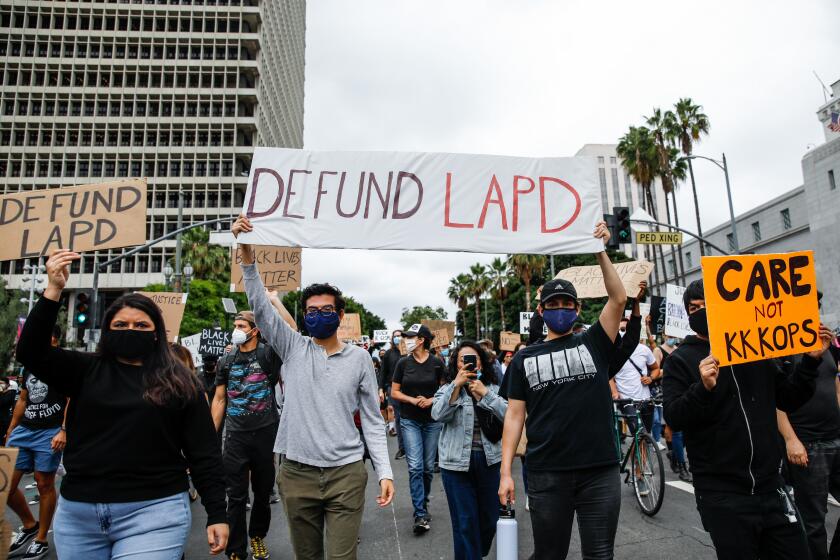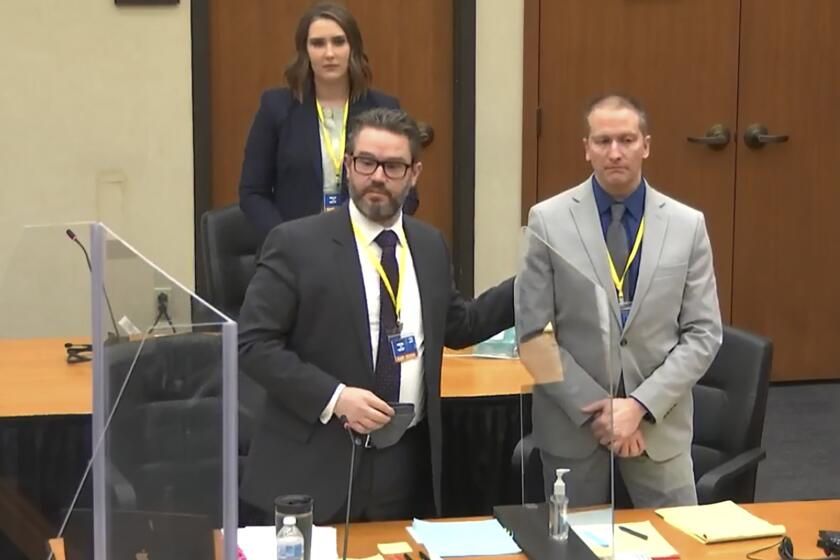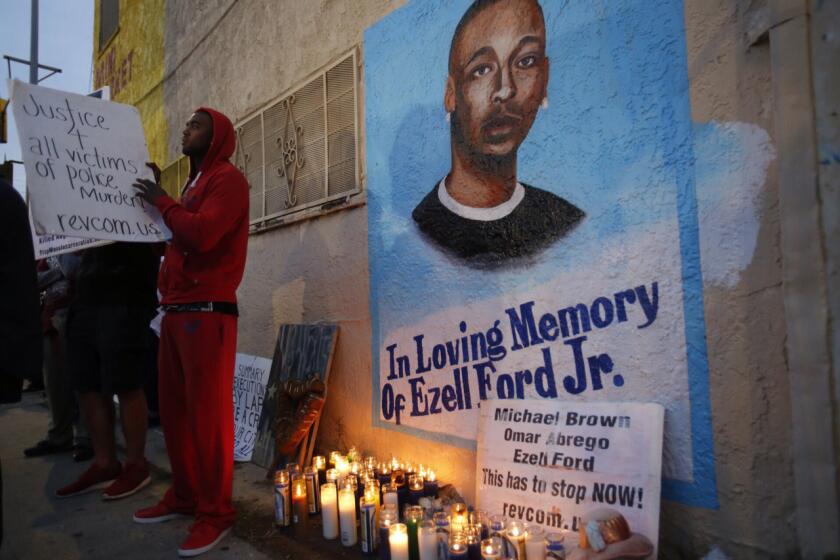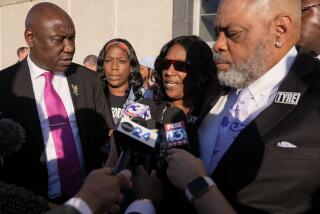Editorial: What the Tyre Nichols videos don’t show
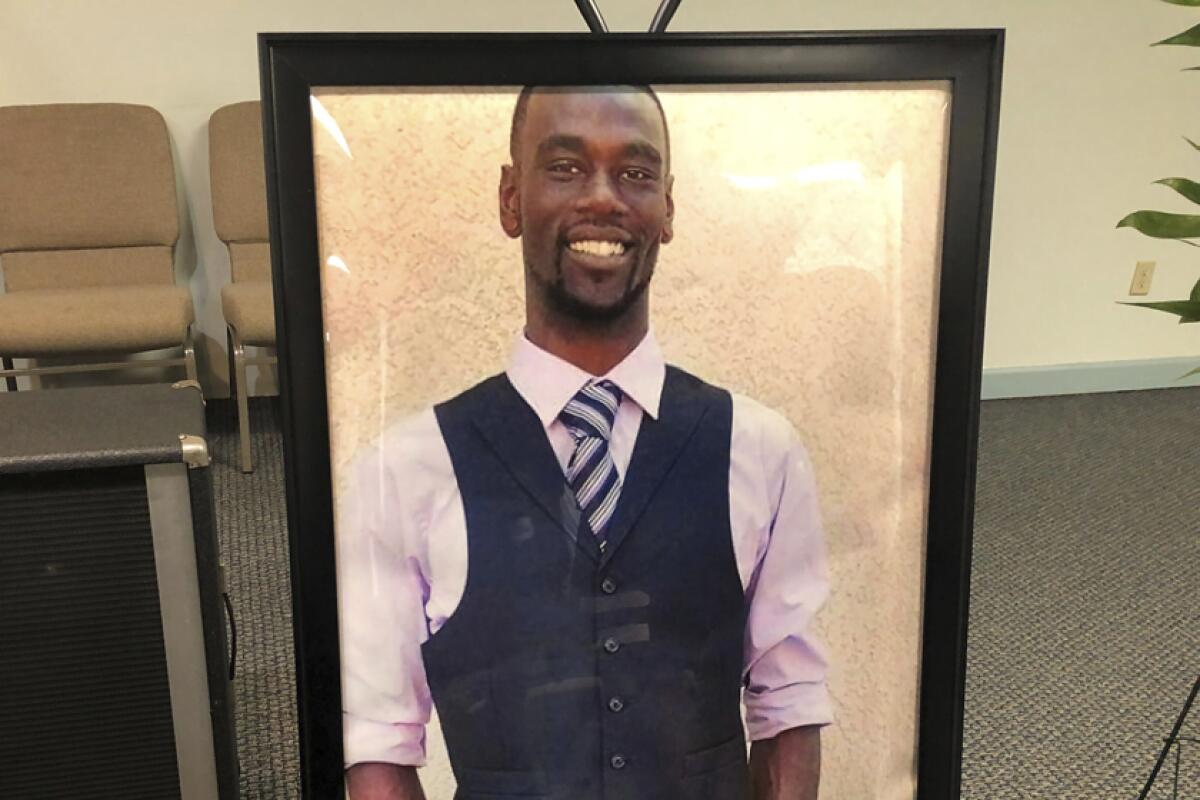
- Share via
The video of Memphis, Tenn., police pulling Tyre Nichols from his car and beating him show a gratuitous and vicious assault on an unarmed motorist who appears to try his best to cooperate. There are also things the video of the fatal Jan. 7 traffic stop doesn’t show, despite efforts by officials and activists to find evidence to back their various assertions about policing in the U.S.
Here are five claims unsupported by the four separate video recordings:
“Race is off the table.”
Nichols was Black, and so are the five officers who attacked him and who were quickly fired and charged with second-degree murder. (A sixth officer, who is white, was suspended Monday pending the outcome of an investigation.) The departure from the sickeningly common narrative of white officers killing unarmed Black civilians has led some to claim that race was not a factor in this incident, or even in other police killings of unarmed Black men in recent years. “It takes off the table that issues and problems in law enforcement [are] about race,” Memphis Police Chief Cerelyn Davis, who is Black, told CNN’s Don Lemon.
Yet white drivers are rarely, if ever, pulled from their cars and beaten to death without provocation by police officers of any race. The Memphis video demonstrates merely that Black officers can as easily as their white counterparts become instruments of a brutal law enforcement system that was largely shaped by historical white privilege. The argument that the officers in the Nichols killing proved race was not an issue has little more validity than a claim that, say, a few Black slave masters in pre-Civil War Charleston, S.C., proved slavery was not rooted in race. It obviously was.
Race, in all its complexities, is a basic factor in unequal distribution of wealth and political power, which inevitably makes it an issue in law enforcement, no matter the color of individual police officers. And the race of the victims remains a central factor. Even Davis, who tried to sweep race off the table, acknowledged that “bias might be a factor [in] the manner in which we engage the community.”
Defunding police is not a new idea, and it is not a panacea. It’s also not crazy.
“You can’t reform that.”
This is a slogan often repeated by police abolitionists who argue that atrocities like the Nichols killing prove no reform can end needlessly violent police attacks. They say that “reform” efforts simply divert an ever-greater share of public funding from schools, jobs and healthcare toward police — for technology such as body-worn cameras and training that never seems to stop police killings.
Actually, though, the video suggests that failed training and supervision (and monumental incompetence) were at the core of the Memphis incident. When the special unit of which the now-fired officers were a part made its debut, Davis, the police chief, emphasized crackdowns on reckless driving. So the officers seemed to believe that getting tough on traffic offenses was central to their job. On Thursday, Davis said there was no proof that Nichols had committed any such offense when he was pulled over.
These failures can and must be reformed. Attentive leaders would ensure that the department recruits and hires officers who are emotionally mature and unlikely to resort to excessive force, and that they are properly trained and supervised by more experienced officers. Justice Department intervention and court oversight may be necessary to force those reforms if department leaders can’t impose them on their own. Reforms might include a reduced police footprint in some areas, especially in traffic stops. But Memphis is one of a handful of cities that already took a step toward police defunding and downsizing in recent years (after trying beefing up its ranks), with uniformly bad results.
“It’s just a few bad apples.”
The Memphis video is proof to many police organizations that the beating was well outside the scope of professional norms, much as when Derek Chauvin went rogue when he crushed the life from George Floyd in Minneapolis in 2020. “This is not representative of those who wear the law enforcement uniform and take an oath to protect and keep their fellow citizens safe,” read a statement from the National Sheriffs’ Assn. on the Nichols killing. If the Memphis officers and others like them are weeded out of police departments, the law enforcement establishment argues, the good cops can do their work with minimal change to current police standards.
But five rogue officers acting in concert? No. The depraved acts shown on the video are evidence of department culture, not a few bad apples. The Memphis Police Departmentsigned on to a set of reforms that the officers blatantly violated: de-escalating, intervening, using verbal commands before resorting to physical force. Either the officers weren’t trained to follow their department’s policy, or they lacked the supervision to ensure they did.
Even though we profess that all men are created equal, we have built a society that dispenses unequal treatment by race and by class, especially in encounters with police.
“Nothing has changed.”
After viewing the sickening video, it’s natural to conclude that nothing in policing has changed since the killing of George Floyd. But the quick release of the bodycam video, and the firing and criminal charges against the Memphis officers, would have been unthinkable three years ago. Arresting police for murder is no longer a novelty.
But the truth is that too little has changed. Something made these five officers believe they were entitled to assault Nichols the way they did: the degradation, the aggression, the pepper spray, the electric shocks, and finally the kicking and clubbing that never seem to end.
Surely we can demand better of our police than the plethora of killings of African Americans.
“If only he had complied.”
A frequent police response to public outcry over fatal force is that the victim would be alive today if only they had complied with officers’ orders.
The Memphis video puts the lie to this claim. It shows Nichols complying with every order despite the cruel assault. He does not resist until, amid the brutal and baseless attack, he breaks loose and runs away. Any sensible person might have done the same upon seeing that compliance is not respected.
In the wake of the video, the only proper response to police who still oppose efforts to transform their practices and their profession is the same command they too often bark at innocent civilians:
Stop resisting.
More to Read
A cure for the common opinion
Get thought-provoking perspectives with our weekly newsletter.
You may occasionally receive promotional content from the Los Angeles Times.
